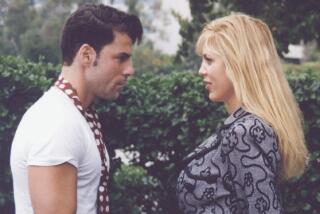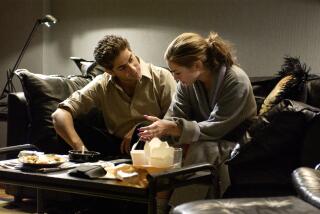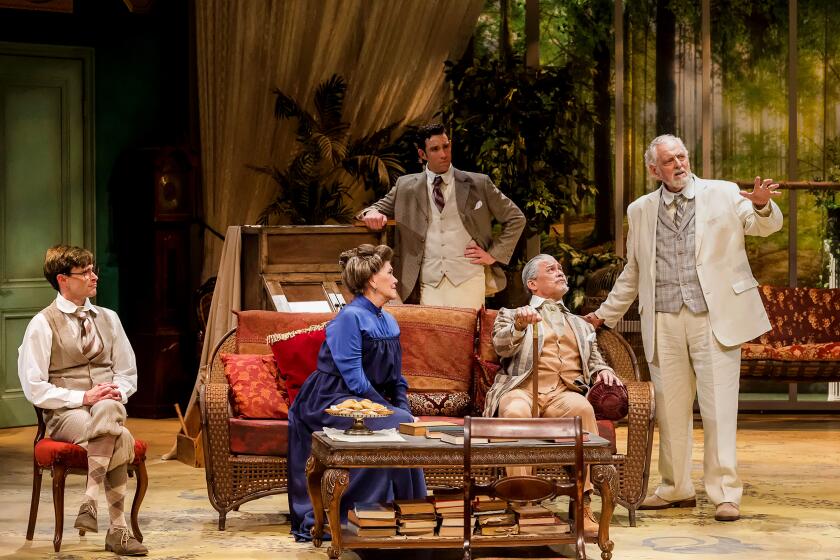O.C. THEATER : Producers Learn What Is in a Name
For a couple of months, the Bard has dominated our attention. First we saw “The Tempest,” Grove Shakespeare’s magical if not entirely spellbinding affair at the Festival Amphitheatre in Garden Grove. Then we saw “The Winter’s Tale,” Shakespeare Orange County’s well-acted but oddly lackluster affair at the Waltmar Theatre in Orange.
Next came “Macbeth,” the Grove’s stellar-looking production with TV stars to match but desperately lacking in the one essential that might have made it work: the coherent acting of a unified company. Instead we got a two-tiered performance. The stars did their thing (very well) while the rest of the players did their thing (with a few exceptions, not very well).
For the record:
12:00 a.m. Aug. 26, 1992 For the Record
Los Angeles Times Wednesday August 26, 1992 Orange County Edition Calendar Part F Page 2 Column 1 Entertainment Desk 1 inches; 24 words Type of Material: Correction
A production of “The Tempest” shown in a photograph on Tuesday’s page F1 was mounted by the Alternative Repertory Theatre. The wrong troupe was credited in the caption.
Finally, came “Hamlet,” a superb textbook example of true ensemble acting from Shakespeare Orange County and only the second local professional staging of the Bard’s greatest tragedy in at least a century.
Meanwhile, the celebrity fever that has gripped the Grove this summer like a nagging head cold appears to be abating, if only briefly. There will be no “name” actors--repeat, no celebrities--in “The Merry Wives of Windsor,” the last play of the Grove’s current outdoor season (coming up on Sept. 2).
The fever peaked two weeks ago with an amateurish fund-raiser, redundantly titled “A Midsummer Night’s Eve,” which was more notable for Sally Kirkland’s left breast and for a ballyhooed cast of celebrity no-shows than for the half-famous and little-known performers who did turn up to do their best.
Wholesale celebrity defections notwithstanding, the Grove hasn’t completely lost its infatuation with stars. As soon as the no-name “Wives” closes at the amphitheater, Salome Jens and Mitch Ryan will take the stage for the Grove in “Long Day’s Journey Into Night” at the adjacent Gem Theatre (beginning Sept. 30).
Just what will Jens and Ryan do for the “sense of company” that Stuart McDowell proclaimed as the Grove’s sine qua non when he took over as artistic director five months ago? Not a whole lot, according to some in the theater company who lament privately about star performers already monopolizing management’s attention.
Actually, much of the Grove’s infatuation with names seems to be driven by associate artistic director Jules Aaron. It was Aaron who persuaded David Birney and Joan Van Ark to appear in “Macbeth.” It is Aaron who gave the two of them a disproportionate amount of time in rehearsal, according to some company members, which might account for the curiously flat performances of almost everybody else but the stars. And it is Aaron who will be staging “Long Day’s Journey.”
But if this summer’s fund-raiser was any measure, it is McDowell himself who seems to love courting celebrities and advertising their cooperation, only to discover they’ve spurned him. Similarly, though he is a man of immense goodwill that cannot be faulted, McDowell has a weakness for hyperbole, frequently using grandiose terms to describe half-formed plans that come to fruition quite differently from his own expectations.
For example, “The Merry Wives of Windsor”--which was to have been his directorial debut at the Grove--will not be staged as a high-concept, music-hall comedy set in the refined late-Georgian period of the 18th Century, as he had announced. Instead, it has been reconceptualized by another director, Richard Risso, and will be done in more customary Tudor style.
Risso is actually the fourth director named for “Wives.” Aaron originally was announced for it but withdrew because of a busy schedule elsewhere. McDowell replaced him but he, too, withdrew to deal with marketing the Grove season and other managerial tasks. He then named his wife, Gloria Skurski, to the job. She bailed out at the 11th hour, for family reasons.
There has been a rash of unexpected changes in technical as well as artistic personnel. Perhaps they’re only coincidental. Nevertheless, McDowell’s “sense of company” doesn’t seem to square with the departure of general manager Charles Johanson, who has resigned effective Oct. 19, and the recent departures of costume designer Sandria Reese and lighting designer Michael Reese.
Johanson has been running the theater’s daily operations since 1991. He quietly informed the theater several weeks ago that he would be leaving. The Reeses, a husband-wife team, were hired for the current summer season. She left earlier this month. He left in July.
McDowell says all three resignations were amicable. Others familiar with the situation are less charitable but won’t speak for the record.
At Shakespeare Orange County, artistic director Thomas F. Bradac appears to be presiding over a maiden season with fewer complications. Not that life there has been easy, either.
“The Winter’s Tale” did not excite the critics. Their lukewarm reviews--combined with the fact that the play is not often done and, therefore, is not one of Shakespeare’s major attractions--inevitably meant a smaller audience and less income for the new professional troupe than hoped.
Bradac says a total of about 1,600 tickets were sold, 400 fewer than he projected. Gross income for the show, which played to a third of capacity on average at the 256-seat Waltmar, came in about $8,000 under budget.
On the other hand, glowing notices for the troupe’s current production of “Hamlet”--and the fact that it is Shakespeare’s most popular play--have led to a rebound at the box office. Audiences have picked up so much, Bradac says, that he expects ticket sales by the end of the run Sunday to more than make up for the “Winter’s Tale” deficit. Houses are averaging better than 50% of capacity, he says.
Equally important, Bradac says he’s certain the company will be back next summer for another season. And now that Shakespeare Orange County has a track record, he believes the current subscription base of 867 season ticket holders will grow considerably.
The summer also has yielded several little-noticed signs of potential amity between the county’s only two professional classical theater companies.
Until now, they’ve displayed a certain coolness toward each other, due less to natural competition than to a thorny history that began when Bradac was ousted as artistic director of the Grove last year and founded the rival troupe with several of the Grove’s best resident actors.
But both Bradac and McDowell have set a friendly tone toward each other. McDowell, who had nothing to do with Bradac’s ouster, attended the opening of “The Winter’s Tale” at Bradac’s invitation and, in another gesture of support, loaned Bradac several costumes from the Grove wardrobe for his staging of “Hamlet.”
Bradac, for his part, still feels uncomfortable going back to his old haunts. He’s warming to the idea, though. All he needs is an invitation.
More to Read
The biggest entertainment stories
Get our big stories about Hollywood, film, television, music, arts, culture and more right in your inbox as soon as they publish.
You may occasionally receive promotional content from the Los Angeles Times.






